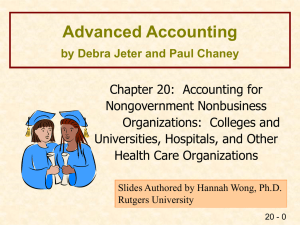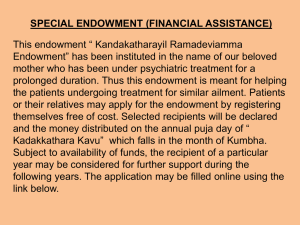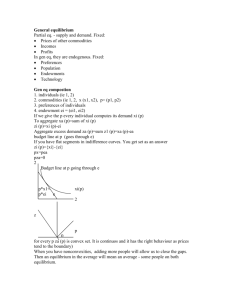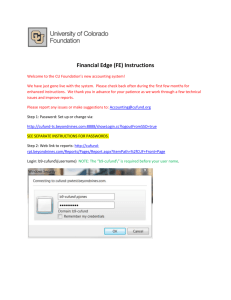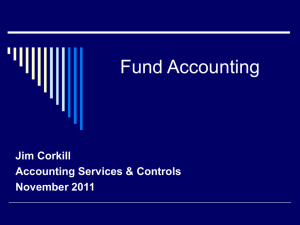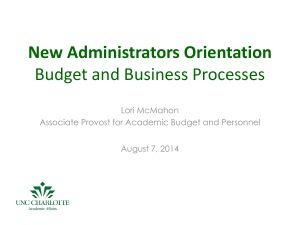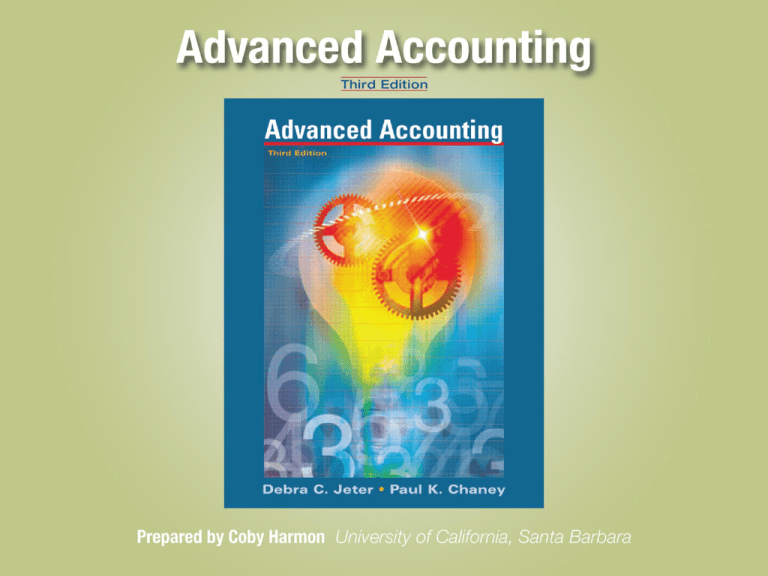
Chapter
19-1
19
Accounting
For Nongovernment
Nonbusiness
Organizations: Colleges
And Universities, Hospitals
And Other Health Care
Organizations
Advanced Accounting, Third Edition
Chapter
19-2
Learning Objectives
1.
Describe the source of accounting standards for
nongovernment nonbusiness organizations (NNOs).
2.
Identify the three basic statements for NNOs.
3.
Describe the basic funds used by nongovernment
nonbusiness organizations.
4.
Distinguish between a current restricted fund and an
unrestricted fund.
5.
Explain the term “assets whose use is limited.”
6.
Distinguish between a mandatory and a nonmandatory
transfer.
7.
Explain how contributions are recorded by NNOs.
Chapter
19-3
Learning Objectives
8.
Understand how donated services are recorded.
9.
Describe the funds used to account for property, plant
and equipment.
10. Explain the basic accounting used by endowment funds.
11. Indicate how equity investments are reported in the
financial statements.
12. Explain the change in accounting for loan funds brought
about by new standards.
13. Understand the use of an annuity or life income fund.
14. Discuss the special reporting issues of hospitals.
Chapter
19-4
Nongovernment Nonbusiness Organizations (NNOs)
Four Major Classifications of NNOs:
1. Nonprofit institutions of higher education.
2. Hospitals and other health care providers.
3. Voluntary health and welfare organizations
(VHWOs).
4. Other nongovernment nonbusiness organizations
(ONNOs).
Chapter
19-5
Hierarchy of Reporting Standards (NNOs)
First level of priority
FASB Statements and Interpretations
APB Opinions
AICPA Accounting Research Bulletins
Second level of priority
FASB Technical Bulletins
AICPA Industry Audit and Accounting Guides
Third level of priority
Consensus positions of FASB emerging issues task force
AICPA AcSec Practice Bulletins
Chapter
19-6
Hierarchy of Reporting Standards (NNOs)
Fourth level of priority
AICPA Accounting Interpretations
Implementation guides
Industry practices
Fifth level of priority
FASB Concept Standards
Pronouncements of other professional associations or
regulatory agencies.
Other accounting literature.
Chapter
19-7
Hierarchy of Reporting Standards (NNOs)
Most guidance for NNOs is found in Audit and Accounting
Guides of the AICPA and in publications of industry:
Chapter
19-8
Colleges and Universities
Audits of Colleges and Universities, 2nd ed. (AICPA, 1975)
Financial Accounting and Reporting Manual for Higher
Education
Hospitals and Other Health Care Providers
Audits of Providers of Health Care Services (AICPA, 1989)
Voluntary Health and Welfare Organizations (VHWOs)
Audits of Voluntary Health and Welfare Organizations
(AICPA, 1988)
Other Nongovernment Nonbusiness Organizations
Audits of Certain Nonprofit Organizations, second edition
(AICPA, 1987).
Financial Reporting for Not-for-Profit
Three Basic Financial Statements required:
1.
Statement of financial position
Net Asset categories:
Unrestricted net assets
Temporarily restricted net assets
Permanently restricted net assets
2. Statement of activities
3. Statement of cash flows
Chapter
19-9
Fund Accounting
Most NNOs use fund accounting for recordkeeping
and reporting purposes.
Six funds commonly used:
1. Current Fund (restricted and unrestricted).
2. Plant Fund.
3. Endowment Fund.
4. Loan Fund.
5. Agency or Custodial Fund.
6. Annuity and Life Income Fund.
Chapter
19-10
Accrual Basis of Accounting
Financial statements for NNOs (accrual basis)
Revenues are reported when earned and
realized or realizable, and
Expenditures are reported when materials or
services are received.
For external reporting purposes,
Revenues are classified by source, and
Expenses and expenditures are classified by
function or activity.
Chapter
19-11
Accounting for Current Funds
Current Unrestricted Funds
Financial resources that may be expended at the
discretion of the governing board
Current Restricted Funds
Resources restricted because of legal, contractual,
or external restrictions on their use.
Current unrestricted resources may be expended at the
discretion of the governing board, whereas current restricted
resources may be expended only in accordance with externally
imposed restrictions.
Chapter
19-12
Accounting for Current Funds
Accounting for Board Designated Funds
Part of current unrestricted fund.
Resources designated by governing board for
specific purposes, projects, or investments.
To limit discretion of management.
Governing board can modify designations.
Hospitals = classified as assets whose use is
limited.
Chapter
19-13
Accounting for Current Funds
Colleges and Universities
Board designated funds for specific current
operating purposes are accounted for by
footnote or by reclassification of the
Unrestricted Current Fund Balance.
Some board-restricted current resources can be
transferred to other funds.
Chapter
19-14
Accounting for Current Funds
Mandatory and Nonmandatory Transfers
Unique to colleges and universities
Mandatory transfers
Transfers from current funds group to other
fund groups arising from
binding legal agreements
grant agreements
Nonmandatory transfers
Transfers from current funds group to other
fund groups at discretion of governing board.
Chapter
19-15
Contributions
SFAS No. 116, requires contributions to be recognized
as revenue in the period received.
Contributions include gifts of cash, pledges, donated
services, and gifts of noncash assets.
Conditional promises to give are recognized when they
become unconditional.
Pledges are recorded as revenues when a promise to
give is nonrevocable and unconditional, at present
value of expected receipts.
Chapter
19-16
Contributions
Exercise 19-6 A well-known celebrity sponsored a
telethon for the Help for the Blind Foundation on
November 1, 2008. Pledges in the amount of $1,000,000
were called in. Using similar telethon campaigns as a
basis, it is estimated that 25% of the pledges will be
uncollectible. During 2009, $700,000 of contributions
from these pledges were collected. The remainder were
uncollectible.
Required: Identify the appropriate fund(s) and prepare
the journal entries necessary in 2008 and 2009 to
record these transactions.
Chapter
19-17
Contributions
Exercise 19-6
2008.
Prepare the journal entries necessary in
Pledges Receivable
1,000,000
Revenue - Contributions
Provision for Uncollectible Pledges
Allowance for Uncollectible Pledges
Chapter
19-18
1,000,000
250,000
250,000
Contributions
Exercise 19-6
2009.
Prepare the journal entries necessary in
Cash
700,000
Pledges Receivable
Provision for Uncollectible Pledges
Allowance for Uncollectible Pledges
Pledges Receivable
Chapter
19-19
700,000
50,000
250,000
300,000
Contributions
Donated Services
Recognized only if the services received:
1.
Create or enhance nonfinancial assets, or
2. a. Require specialized skills,
b. Are provided by individuals possessing those
skills, and
c. Would need to be purchased if not provided
by donation.
Recorded as revenue or support with an amount equal to the revenue
recognized as an expense in the appropriate expense account.
Chapter
19-20
Contributions
Exercise 19-2 During 2008 volunteer pinstripers donated
their services to General Hospital at no cost. The staff at
General Hospital was in control of the pinstripers’ duties. If
regular employees had provided the services rendered by the
volunteers, their salaries would have totaled $6,000. While
working for the hospital, the pinstripers received
complimentary meals from the cafeteria, which normally
would have cost $500. Required: Prepare the journal entry
necessary in the General Fund to record the donated services
on the books of General Hospital.
General Services Expense
5,500
Donated Services (Nonoperating Revenue)
Chapter
19-21
5,500
Contributions
Donor-imposed Restricted Contributions
Recorded as contribution revenues in period received,
thus increasing either temporarily or permanently
restricted net assets.
When expenditures are made, or restriction expires,
net assets are reported as unrestricted net assets on
the Statement of Activities.
Chapter
19-22
Contributions
Exercise 19-3 The Franklin Public Library received a
restricted contribution of $300,000 in 2008. The donor
specified that the money must be used to acquire books
of poetry written in the sixteenth century. As of
December 31, 2008, only $100,000 of the restricted
resources had been expended.
Required: Prepare the journal entries necessary to
record these events during 2008. Indicate the fund in
which each journal entry is recorded.
Chapter
19-23
Contributions
Exercise 19-3 Prepare the journal entries necessary
to record these events during 2008.
Restricted Current Fund
Cash
300,000
Contribution Revenue – Poetry Collection
300,000
Net Assets Released from Restrictions
Cash
100,000
100,000
Unrestricted Current Fund
Cash
100,000
Net Assets Released from Restrictions
100,000
Expenses – Poetry Collection
Cash
100,000
Chapter
19-24
100,000
Accounting for Plant Funds
The plant fund is used to account for
(1) property, plant and equipment (PP&E) owned by
the organization and the net investment,
(2) accumulation of financial resources for
acquisition or replacement of PP&E,
(3) acquisition and disposal of PP&E,
(4) liabilities relating to acquisition of PP&E, and
(5) depreciation expense and accumulated
depreciation.
Chapter
19-25
Accounting for Plant Funds
College and Universities
Divided into four separate self-balancing subgroups:
1. Unexpended Plant Fund
2. Funds for Renewals and Replacements
3. Funds for Retirement of Indebtedness
4. Investment in Plant
Both board-designated funds and externally restricted funds are
accounted for in the plant fund; therefore, a distinction is made
between restricted and unrestricted fund balances.
Chapter
19-26
Accounting for Plant Funds
Exercise 19-8 The After the election of a prominent
political figure, the principal from a term endowment
fund was expendable by Crandall University. The official
was elected this year. The fund was restricted to the
construction of a Political Science building annex. The
following transactions occurred because of this event.
Required: For each of the following transactions,
record the journal entries and identify the fund or fund
subgroup in which each entry is recorded.
Chapter
19-27
Accounting for Plant Funds
Exercise 19-8
1. A transfer of $3,000,000 is made from the Endowment
Fund (Term) to the Unexpended Plant Fund.
Endowment Fund
Endowment fund balance
Cash
3,000,000
3,000,000
Unexpended Plant Fund
Cash
Fund Balance - Restricted
Chapter
19-28
3,000,000
3,000,000
Accounting for Plant Funds
Exercise 19-8
2. Construction is begun on the Political Science annex.
Costs of construction during the year amounted to
$1,000,000, of which $30,000 remained unpaid at the end
of the year. (The financial controller does not record
transfers to the Investment in Plant subgroup until a
project has been completed.)
Unexpended Plant Fund
Construction in process
Cash
Accounts payable
Chapter
19-29
1,000,000
970,000
30,000
Accounting for Plant Funds
Exercise 19-8
3. By the end of the following year, the annex is
completed at an additional cost of $2,100,000. All costs
have been paid.
Unexpended Plant Fund
Chapter
19-30
Construction in process
Accounts payable
Cash
2,100,000
30,000
Building
Work in process
3,100,000
2,130,000
3,100,000
Accounting for Plant Funds
Exercise 19-8
4. The completed building is recorded in the Investment in
Plant subgroup.
Net Investment in Plant Fund
Building
Net investment in plant
Chapter
19-31
3,100,000
3,100,000
Accounting for Plant Funds
Hospitals
Property, plant and equipment (PP&E) transactions
are accounted for in the General Fund.
Contributed resources restricted to acquire PP&E
are accounted for in a plant replacement and
expansion (restricted) fund.
Upon expenditure, the assets acquired and the
related fund balance are transferred to the
General Fund.
Chapter
19-32
Accounting for Plant Funds
Voluntary Health and Welfare and ONNOs
Single Plant Fund and report the fund balance in two
classifications:
Expended Fund Balance is equal to the organization’s
net investment in PP&E.
Unexpended Fund Balance represents the amount of
resources available to replace or acquire additional
PP&E.
Chapter
19-33
Accounting for Endowment Funds
Pure Endowment Fund - donated funds have been
given in perpetuity.
Term Endowment Fund - donor has specified
a particular date or event after which the principal of
the endowment fund may be expended.
Income from endowment funds generally may be
expended as earned either for specified purposes or
at the discretion of the governing board.
Chapter
19-34
Accounting for Endowment Funds
Exercise 19-7 (partial) Jefferson Hospital received
money from a donor to set up an endowment fund. The
following information pertains to this contribution.
Prepare the journal entries necessary to record the
events in the endowment fund.
Chapter
19-35
Accounting for Endowment Funds
Exercise 19-7 (partial) During 2008
1. $2,000,000 was received to establish the fund. The
requirements were (a) $100,000 of the endowment fund’s
income must be used for research grants each year. (b) The
remainder of income is under the discretion of the governing
board. (c) The principal is expendable after the donor’s
death. It shall be used to purchase equipment.
Cash
Revenue Contribution - Restricted
Chapter
19-36
2,000,000
2,000,000
Accounting for Endowment Funds
Exercise 19-7 (partial) During 2008
2. The cash received was invested in a number of
securities.
Investment
Cash
Chapter
19-37
2,000,000
2,000,000
Accounting for Endowment Funds
Exercise 19-7 (partial) During 2009
3. Dividends of $100,000 and interest of $300,000
were received.
Cash
Chapter
19-38
400,000
Due to General Fund
300,000
Due to Specific Purpose Fund
100,000
Accounting for Endowment Funds
Exercise 19-7 (partial) During 2009
4. The income was transferred to the appropriate
funds.
Due to General Fund
300,000
Due to Specific Purpose Fund
100,000
Cash
Chapter
19-39
400,000
Accounting for Endowment Funds
Exercise 19-7 (partial) During 2010
8. The was notified of the donor death.
Transfer to Plant Replacement
and Expansion Fund
Cash
Chapter
19-40
2,000,000
2,000,000
Accounting for Investments
SFAS No. 124, “Accounting for Certain Investments
Held by Not-for-Profit Organizations,”
Requires NPOs to report investments in equity securities
with readily determinable fair values and all debt securities
at fair value in unrestricted, temporarily restricted, or
permanently restricted net assets.
Unrealized and realized gains and losses are to be
recognized in the Statement of Activities.
To improve effectiveness and flexibility, NNOs often
pool investments of different funds into a single
portfolio.
Chapter
19-41
Accounting for Loan Funds
Loans to:
Students and staff of colleges and universities,
Employees of hospitals, and
Beneficiaries of the interests of certain ONNOs.
(for example, loans to music students by symphony
orchestra societies).
Chapter
19-42
Accounting for Loan Funds
Exercise 19-4 The following events relate to Grearson University
Loan Fund:
1. $100,000 is received from an estate to establish a faculty and
student loan fund. Annual interest rates range from 8% for
students to 10% for faculty.
2. Loans to students totaled $60,000, and $40,000 was disbursed
to faculty members (of the total loans made, 10% are estimated to
be uncollectible).
3. Grearson wrote off a $1,000 student loan as uncollectible.
4. The following loans were repaid.
Faculty
Student
Chapter
19-43
Principal
$ 5,000
10,000
Interest
$500
800
Accounting for Loan Funds
Exercise 19-4 Prepare the journal entries necessary
to record these transactions.
1. $100,000 is received from an estate to establish a
faculty and student loan fund. Annual interest rates
range from 8% for students to 10% for faculty.
Cash
100,000
Revenue – Contributions Restricted
Chapter
19-44
100,000
Accounting for Loan Funds
Exercise 19-4 Prepare the journal entries necessary to
record these transactions.
2. Loans to students totaled $60,000, and $40,000 was
disbursed to faculty members (of the total loans made, 10%
are estimated to be uncollectible).
Loans Receivable – Students
Loans Receivable – Faculty
Cash
60,000
40,000
Bad Debt Expense
Allowance for Uncollectible–Students
Allowance for Uncollectible–Faculty
10,000
Chapter
19-45
100,000
6,000
4,000
Accounting for Loan Funds
Exercise 19-4 Prepare the journal entries necessary to
record these transactions.
3. Grearson wrote off a $1,000 student loan as
uncollectible.
Allowance for Uncollectible–Students
Loans Receivable – Students
Chapter
19-46
100,000
100,000
Accounting for Loan Funds
Exercise 19-4 Prepare the journal entries necessary to
record these transactions.
4. The following loans were repaid.
Principal
Faculty
$ 5,000
Student
10,000
Cash
Loans Receivable – Students
Chapter
19-47
Interest
$500
800
16,300
10,000
Loans Receivable – Faculty
5,000
Interest Income
1,300
Accounting for Agency (Custodial) Funds
Account for assets held by NNO as custodian for
others.
Unless significant amounts are involved, resources held
by an NNO as an agent for others are often accounted
for as assets and liabilities in the unrestricted or
general fund rather than in a separate agency fund.
Chapter
19-48
Accounting for Annuity and Life Income Funds
Contribution to the organization on the condition that the
organization make annuity payments to a specified
recipient for a specified period of time (annuity fund) or
that the organization pay the income earned on the
contributed assets to a specified recipient during his or
her lifetime (life income fund).
At the end of the annuity or on the death of the life
income beneficiary, the unexpended assets of the fund
are transferred to the unrestricted fund or to an
endowment fund, loan fund, plant fund, or other fund
specified by the donor.
Chapter
19-49
Accounting for Annuity and Life Income Funds
Annuity Fund - Annuity payments made to a specified
recipient for a specified period of time.
Life Income Fund - Income earned on contributed assets
is paid to a specified recipient during his or her lifetime.
At the end of the annuity or on the death of the life
income beneficiary, the unexpended assets of the fund
are transferred to the unrestricted fund or to an
endowment fund, loan fund, plant fund, or other fund
specified by the donor.
Chapter
19-50
Issues Relating to Colleges and Universities
Recognition of Service Fee Revenue
Operating versus Nonoperating Income
Issues Relating to Hospitals
Charity care
Contractual allowances
Capitation revenues
Malpractice
Chapter
19-51
Copyright
Copyright © 2008 John Wiley & Sons, Inc. All rights reserved.
Reproduction or translation of this work beyond that permitted
in Section 117 of the 1976 United States Copyright Act without
the express written permission of the copyright owner is
unlawful. Request for further information should be addressed
to the Permissions Department, John Wiley & Sons, Inc. The
purchaser may make back-up copies for his/her own use only
and not for distribution or resale. The Publisher assumes no
responsibility for errors, omissions, or damages, caused by the
use of these programs or from the use of the information
contained herein.
Chapter
19-52


